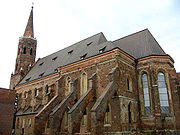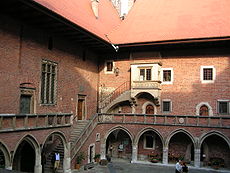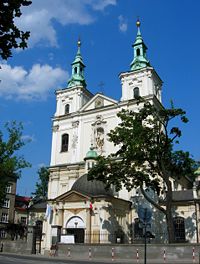
John of Głogów
Encyclopedia
- Another John of Glogau had died in 1377
John of Głogów (ca. 1445 – 11 February 1507) was a notable polyhistor at the turn of the Middle Ages
Middle Ages
The Middle Ages is a periodization of European history from the 5th century to the 15th century. The Middle Ages follows the fall of the Western Roman Empire in 476 and precedes the Early Modern Era. It is the middle period of a three-period division of Western history: Classic, Medieval and Modern...
and Renaissance
Renaissance
The Renaissance was a cultural movement that spanned roughly the 14th to the 17th century, beginning in Italy in the Late Middle Ages and later spreading to the rest of Europe. The term is also used more loosely to refer to the historical era, but since the changes of the Renaissance were not...
—a philosopher, geographer
Geographer
A geographer is a scholar whose area of study is geography, the study of Earth's natural environment and human society.Although geographers are historically known as people who make maps, map making is actually the field of study of cartography, a subset of geography...
and astronomer
Astronomer
An astronomer is a scientist who studies celestial bodies such as planets, stars and galaxies.Historically, astronomy was more concerned with the classification and description of phenomena in the sky, while astrophysics attempted to explain these phenomena and the differences between them using...
at the University of Krakow.
Life
John was born into the Schelling family in Głogów (in GermanGerman language
German is a West Germanic language, related to and classified alongside English and Dutch. With an estimated 90 – 98 million native speakers, German is one of the world's major languages and is the most widely-spoken first language in the European Union....
, Glogau) in the Lower Silesia
Lower Silesia
Lower Silesia ; is the northwestern part of the historical and geographical region of Silesia; Upper Silesia is to the southeast.Throughout its history Lower Silesia has been under the control of the medieval Kingdom of Poland, the Kingdom of Bohemia and the Austrian Habsburg Monarchy from 1526...
n Duchy of Głogów, which from 1331 had belonged to Bohemia
Bohemia
Bohemia is a historical region in central Europe, occupying the western two-thirds of the traditional Czech Lands. It is located in the contemporary Czech Republic with its capital in Prague...
and thus, during his lifetime, to the Holy Roman Empire
Holy Roman Empire
The Holy Roman Empire was a realm that existed from 962 to 1806 in Central Europe.It was ruled by the Holy Roman Emperor. Its character changed during the Middle Ages and the Early Modern period, when the power of the emperor gradually weakened in favour of the princes...
. He variously styled himself Johannes Glogoviensis, Glogerus, de Glogovia and Glogowita; but while he may have been of German extraction, he never used the name "Schelling."

Bachelor's degree
A bachelor's degree is usually an academic degree awarded for an undergraduate course or major that generally lasts for three or four years, but can range anywhere from two to six years depending on the region of the world...
, and after two more — his licentiate
Licentiate
Licentiate is the title of a person who holds an academic degree called a licence. The term may derive from the Latin licentia docendi, meaning permission to teach. The term may also derive from the Latin licentia ad practicandum, which signified someone who held a certificate of competence to...
. In 1468 he received his Magister Artium degree, the equivalent of a Doctor of Philosophy
Doctor of Philosophy
Doctor of Philosophy, abbreviated as Ph.D., PhD, D.Phil., or DPhil , in English-speaking countries, is a postgraduate academic degree awarded by universities...
degree. This was but the beginning of a forty-year academic career. He would later also obtain a baccalaureate in theology.
John of Głogów was an adherent of the Cologne
Cologne
Cologne is Germany's fourth-largest city , and is the largest city both in the Germany Federal State of North Rhine-Westphalia and within the Rhine-Ruhr Metropolitan Area, one of the major European metropolitan areas with more than ten million inhabitants.Cologne is located on both sides of the...
Thomism
Thomism
Thomism is the philosophical school that arose as a legacy of the work and thought of St. Thomas Aquinas, philosopher, theologian, and Doctor of the Church. In philosophy, his commentaries on Aristotle are his most lasting contribution...
, a philosophical school that upheld the legacy of Thomas Aquinas
Thomas Aquinas
Thomas Aquinas, O.P. , also Thomas of Aquin or Aquino, was an Italian Dominican priest of the Catholic Church, and an immensely influential philosopher and theologian in the tradition of scholasticism, known as Doctor Angelicus, Doctor Communis, or Doctor Universalis...
. But while siding in some questions with Thomas, in others he sided with Albertus Magnus
Albertus Magnus
Albertus Magnus, O.P. , also known as Albert the Great and Albert of Cologne, is a Catholic saint. He was a German Dominican friar and a bishop, who achieved fame for his comprehensive knowledge of and advocacy for the peaceful coexistence of science and religion. Those such as James A. Weisheipl...
.


Liberal arts
The term liberal arts refers to those subjects which in classical antiquity were considered essential for a free citizen to study. Grammar, Rhetoric and Logic were the core liberal arts. In medieval times these subjects were extended to include mathematics, geometry, music and astronomy...
. His greatest passions were grammar
Grammar
In linguistics, grammar is the set of structural rules that govern the composition of clauses, phrases, and words in any given natural language. The term refers also to the study of such rules, and this field includes morphology, syntax, and phonology, often complemented by phonetics, semantics,...
, Aristotelian logic, physics
Physics
Physics is a natural science that involves the study of matter and its motion through spacetime, along with related concepts such as energy and force. More broadly, it is the general analysis of nature, conducted in order to understand how the universe behaves.Physics is one of the oldest academic...
, physiology
Physiology
Physiology is the science of the function of living systems. This includes how organisms, organ systems, organs, cells, and bio-molecules carry out the chemical or physical functions that exist in a living system. The highest honor awarded in physiology is the Nobel Prize in Physiology or...
, and astronomy
Astronomy
Astronomy is a natural science that deals with the study of celestial objects and phenomena that originate outside the atmosphere of Earth...
. In 1478 and 1489–90 he was dean of the department of arts. He wrote textbooks covering the complete range of philosophical knowledge at the time. His numerous extant works cover grammar
Grammar
In linguistics, grammar is the set of structural rules that govern the composition of clauses, phrases, and words in any given natural language. The term refers also to the study of such rules, and this field includes morphology, syntax, and phonology, often complemented by phonetics, semantics,...
, logic
Logic
In philosophy, Logic is the formal systematic study of the principles of valid inference and correct reasoning. Logic is used in most intellectual activities, but is studied primarily in the disciplines of philosophy, mathematics, semantics, and computer science...
, philosophy
Philosophy
Philosophy is the study of general and fundamental problems, such as those connected with existence, knowledge, values, reason, mind, and language. Philosophy is distinguished from other ways of addressing such problems by its critical, generally systematic approach and its reliance on rational...
, geography
Geography
Geography is the science that studies the lands, features, inhabitants, and phenomena of Earth. A literal translation would be "to describe or write about the Earth". The first person to use the word "geography" was Eratosthenes...
, astronomy
Astronomy
Astronomy is a natural science that deals with the study of celestial objects and phenomena that originate outside the atmosphere of Earth...
and astrology
Astrology
Astrology consists of a number of belief systems which hold that there is a relationship between astronomical phenomena and events in the human world...
. He won fame in the latter field with his "prognostications"; in one of these, he predicted the advent of a "black friar
Friar
A friar is a member of one of the mendicant orders.-Friars and monks:...
" who would bring disarray to Christianity
Christianity
Christianity is a monotheistic religion based on the life and teachings of Jesus as presented in canonical gospels and other New Testament writings...
. The friar would later be identified with the Augustinian monk, Martin Luther
Martin Luther
Martin Luther was a German priest, professor of theology and iconic figure of the Protestant Reformation. He strongly disputed the claim that freedom from God's punishment for sin could be purchased with money. He confronted indulgence salesman Johann Tetzel with his Ninety-Five Theses in 1517...
.
John of Głogów wrote a work entitled Introductio in artem numerandi (Latin
Latin
Latin is an Italic language originally spoken in Latium and Ancient Rome. It, along with most European languages, is a descendant of the ancient Proto-Indo-European language. Although it is considered a dead language, a number of scholars and members of the Christian clergy speak it fluently, and...
: Introduction to the Art of Using Numbers; 1497). He wrote commentaries to Ptolemy
Ptolemy
Claudius Ptolemy , was a Roman citizen of Egypt who wrote in Greek. He was a mathematician, astronomer, geographer, astrologer, and poet of a single epigram in the Greek Anthology. He lived in Egypt under Roman rule, and is believed to have been born in the town of Ptolemais Hermiou in the...
's Cosmography. He is thought to have been one of the teachers of Nicolaus Copernicus
Nicolaus Copernicus
Nicolaus Copernicus was a Renaissance astronomer and the first person to formulate a comprehensive heliocentric cosmology which displaced the Earth from the center of the universe....
, who enrolled at the University of Krakow in 1491.
John authored 60 volumes, mainly astronomical and astrological. His grammar
Grammar
In linguistics, grammar is the set of structural rules that govern the composition of clauses, phrases, and words in any given natural language. The term refers also to the study of such rules, and this field includes morphology, syntax, and phonology, often complemented by phonetics, semantics,...
was used in Kraków schools for over a century. He is reputed to have been the first in Poland to note the discovery of America
Americas
The Americas, or America , are lands in the Western hemisphere, also known as the New World. In English, the plural form the Americas is often used to refer to the landmasses of North America and South America with their associated islands and regions, while the singular form America is primarily...
.
John's works show little originality, but his erudition
Erudition
The word erudition came into Middle English from Latin. A scholar is erudite when instruction and reading followed by digestion and contemplation have effaced all rudeness , that is to say smoothed away all raw, untrained incivility...
was impressive.
His first two years of lecturing had given him entree to the Kraków Academy's Collegium Minus (the Lesser College), and from 1484 he had been a member of the Collegium Maius
Collegium Maius
The Collegium Maius , in Kraków, Poland, is the Jagiellonian University's oldest building, dating back to the 15th century. It stands at the corner of ulica Jagiellońska and ulica Świętej Anny The Collegium Maius (Latin for "Great College"), in Kraków, Poland, is the Jagiellonian University's...
(the Greater College). Collegiate membership entailed a semi-monastic life and the observation of an uncommonly austere regime. He devoted his income to charitable works.
John took a special interest in students from his native Silesia
Silesia
Silesia is a historical region of Central Europe located mostly in Poland, with smaller parts also in the Czech Republic, and Germany.Silesia is rich in mineral and natural resources, and includes several important industrial areas. Silesia's largest city and historical capital is Wrocław...
, building and operating a dormitory
Dormitory
A dormitory, often shortened to dorm, in the United States is a residence hall consisting of sleeping quarters or entire buildings primarily providing sleeping and residential quarters for large numbers of people, often boarding school, college or university students...
for them. Between 1433 and 1510, 120 scholars from Głogów matriculated at Kraków—one of the largest groups, alongside those from Wrocław.
John of Głogów, an "ornament of Kraków University
Jagiellonian University
The Jagiellonian University was established in 1364 by Casimir III the Great in Kazimierz . It is the oldest university in Poland, the second oldest university in Central Europe and one of the oldest universities in the world....
," died in Kraków
Kraków
Kraków also Krakow, or Cracow , is the second largest and one of the oldest cities in Poland. Situated on the Vistula River in the Lesser Poland region, the city dates back to the 7th century. Kraków has traditionally been one of the leading centres of Polish academic, cultural, and artistic life...
on 11 February 1507 and was interred at St. Florian's Church
St. Florian's Church
The Collegiate Church of St. Florian is a historic church in Kraków, Poland. It stands at the northern end of Matejko Square and the former centre of the mediaeval city of Kleparz, now a district of Kraków. The edifice marks the beginning of the Royal Road....
.
See also
- History of philosophy in Poland
- List of Poles
External links
- The Scientific Medieval Treatises of the Jagiellonian University 14th-16th c. from the collections of the Jagiellonian LibraryJagiellonian LibraryJagiellonian Library is the library of the Jagiellonian University in Kraków and with almost 6.7 million volumes, one of the biggest libraries in Poland, serving as a public library, university library and part of the Polish national library system...
(Biblioteka Jagiellońska, 30-059 Kraków, Al. Mickiewicza 22) "Jan z Głogowa" ("Jan of Głogów"), Perspektywa Kulturalna (Cultural Perspective), 2007, ISSN 1897-9475.

